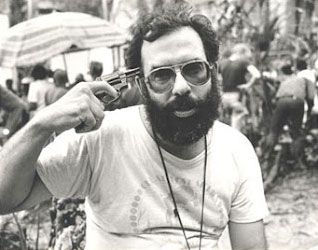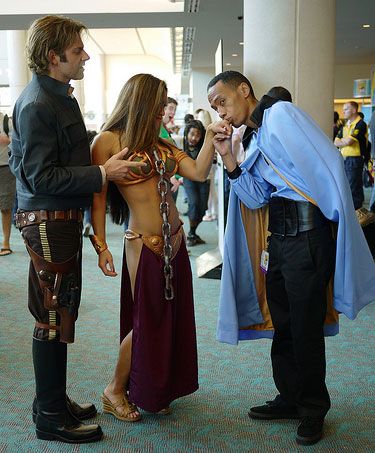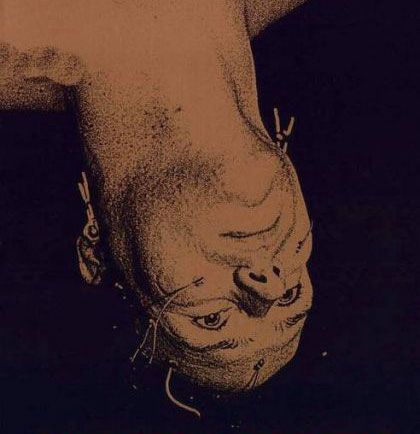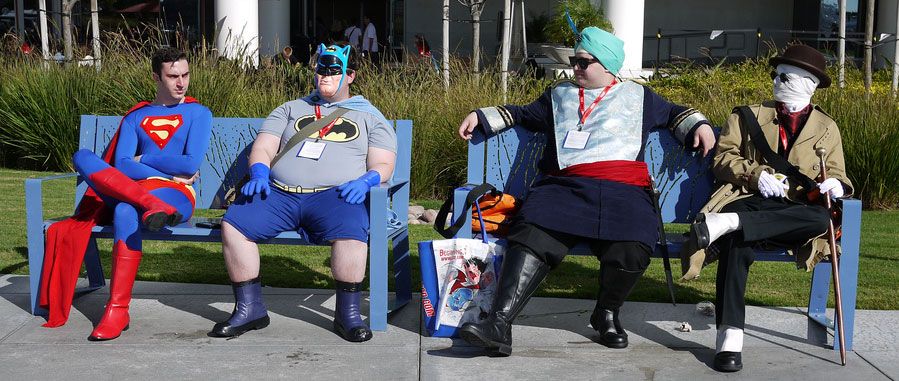Comic-Con International, TED, pop-up communes, Burning Man... these places should all offer drastically different experiences, but the similarities are pretty important. For a limited time, they each offer a mass, consensual altered reality, and having experienced all of them, I've found that the differences are mostly cosmetic and when they're over, everyone is different.
This is the time of year when people are writing their "how to prepare for Comic-Con" articles, which makes sense but it can start to seem like we're about to climb Everest, (and if you don't remember to stuff that energy bar in your bag, you're going to die on a frozen precipice somewhere... or the Comic-Con equivalent; a 3 hour line in the sun for a panel about a show on the SyFy channel that they're going to cancel next week.) In reality, it's a relatively civilized event and if you forget to bring your energy bars (or whatever sundries you deem essential), you can easily leave the convention center to buy it. No, the real preparation is internal, because just like TED, or a pop-up commune, or Burning man, it is going to change you. The physical preparation isn't the exciting part, the exciting part is how it will affect us.
Unlike a lot of life, there is a finite beginning and end to something like Comic-Con. Knowing this, people throw themselves into it with total abandon. There is only so much to get out of it, and unless you're just going there to shlep two suitcases of comic books for autographs from writer to artist for days on end (which is a great way to turn Comic-Con into a job), then you're going to have a perception altering experience.
I was very lucky to work at a TED conference back when it was still owned by the creator, Richard Saul Wurman, an abrasive and entertaining mad genius of a man. At that time there wasn't a single video from TED online, most people hadn't heard of it, so working at the convention or attending it was the only way to hear the dozens of fascinating speakers ever day. I was careful to plan it so that I could attend the talks by speakers who I thought would be most interesting to me, mostly designers and artists. Luckily I was also free to hear random people speak, and this is how I discovered that although I love graphic design, hearing people talk knowledgeably about a subject that I'm already immersed in isn't always the best use of my time. Instead I found myself thrilled to hear talks by musicians, social activists, doctors, research scientists, astronauts, and philosophers. My world became infinitely broader, suddenly I was interested in so many things, saw the excitement of learning about the connections between everything. Prior to TED it would definitely never have occurred to me that I would have something to talk about with people who's field was so far from mine, but now I saw that by discussing and questioning each other, we could all benefit.
Have you ever seen Hearts of Darkness, about the filming of Apocalypse Now? In it, one of the actors talks about the experience of filming, and how deeply life-altering it was for all of them. Obviously this is a very extreme and prolonged example of the kind of experience we're talking about, but back when I saw it, it was the first time that I'd ever heard someone talk about this kind of emotional upheaval outside of a therapeutic context. It opened my eyes to what is possible when people come together and, for a short period of time, agree to live in a reality that is completely saturated with something outside of their daily lives.
There is a school of thought that advises people to become deeply involved in whatever the task at hand in order to attain a higher consciousness. The theory is that even the most mundane work can feel satisfying (and even transcendent) if we are able to focus on it lovingly and intensely. In life, it is difficult to sustain this level of commitment to any thing. Work, family, and home can all become so familiar that we lose track of the potential for joy within them. While a vacation might seem like a good solution, all too often they're just too short to provide the change in perspective. The ideal solution is to create a condensed kind of a vacation for the mind, something which quickly and radically alters the way we perceive reality.
Comic-Con, or any of the other conventions and events I've mentioned, are important because they're about immersion. It is about committing attention to a space and time which is entirely out of the context of our "normal", mundane, everyday lives. It is about breaking the routine and doing something so radically different that it shakes us out of our predictable patterns. With something as passive as a vacation, where we go somewhere in isolation (alone or with very small groups) it is all too easy to remain internally engaged with one's non-vacation life. However, going to something like Comic-Con (or TED, or Burning Man, etc) involves opting out of the usual, and doing so with a massive group of people. It is this joined, consensual altering of our shared reality that creates such powerful momentum. We are using our collective energies to change the direction of our attention, and thereby also coming together to change our lives, even just for a short time.
It isn't about which convention or event, where it is, or what the area of interest is, it is about sharing it with masses of people in a place that is different from home. Whether we like each other or not, we join together to briefly create a new reality and that is one of the many reasons that I'm so excited Comic-Con starts today.




